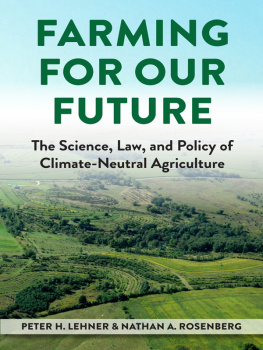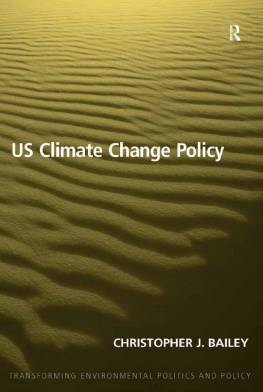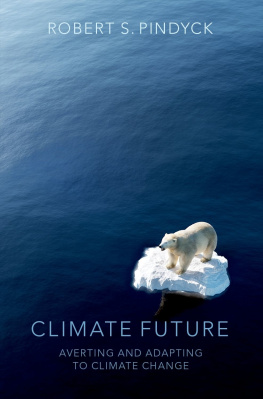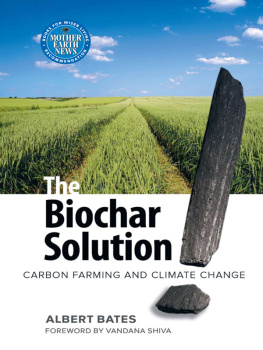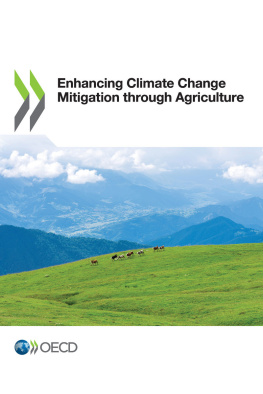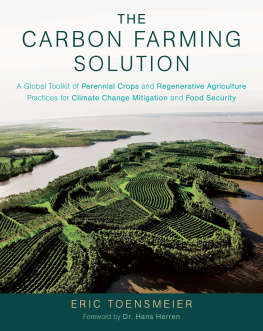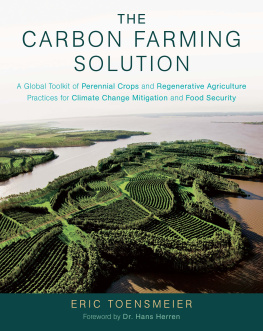Landmarks
Page list

Praise for Farming for Our Future
Farming for Our Future offers a comprehensive and persuasive blueprint for eliminating net agricultural emissions in the United States. This timely and compelling book is packed with original research, well-sourced analyses, and innovative solutions. Lehner and Rosenberg are clear-eyed about the challenges presented by todays agricultural practices and policies, yet thoughtfully lay out the path forward. This book will be an invaluable resource for years to come.
Emily M. Broad Leib, Clinical Professor of Law and Director, Food Law and Policy Clinic, Harvard Law School
Resilient diversified farms are born from plenty of research, data, supportive policy, and an array of well-managed practices. So, too, a thriving world. In this book, Peter Lehner and Nathan Rosenberg show us why climate stability and resilience must be major goals in all agriculture law. With the right tools and an unwavering focus on programs and policies that reward ecosystem services, we can combat our current climate crisis, safeguarding not only our food, but our future.
Sherri Dugger, Executive Director, Socially Responsible Agriculture Project
Unless we transform farming and food production, many of the gains we make through transformation of our energy and transportation sectors will be wiped out by agriculture. Farming for Our Future provides a timely and clear-eyed take on the possibilitiesand pitfallsof a climate-smart food system.
Scott Faber, Senior Vice President, Government Affairs, Environmental Working Group
Agriculture has long occupied too small a role in U.S. climate policy discussions, despite its considerable direct and indirect contribution to greenhouse gas emissions and its tremendous capacity to absorb carbon dioxide from the atmosphere. This book should elevate agriculture to greater prominence in these discussions. Peter Lehner and Nathan Rosenberg have gone deeper and broader than anyone before in identifying the many legal levers that can be used to move agriculture toward carbon neutrality. Congress, the White House, USDA, other agencies, and the private sector should use this as their legal guide.
Michael B. Gerrard, Professor and Director, Sabin Center for Climate Change Law, Columbia Law School
Farms are a major contributor to climate change, are impacted by climate change in a big way, and, with practical farming system changes, can be a major contributor to climate change mitigation. Lehner and Rosenberg lay out the details in a highly readable and succinct manner and with a strong emphasis on the policies that need to be adopted to reach a net zero agriculture in the United States. Their prescriptions form a well-drawn blueprint for the White House and USDA to follow and for Congress to adopt in the 2023 federal farm bill. Adoption of the books recommendations would put U.S. agriculture on a rapid path to decarbonization and resilience. Policymakers should pay heed!
Ferd Hoefner, Policy Consultant and Former Policy Director of the National Sustainable Agriculture Coalition
Farming for our Future is a must read for anyone interested in agriculture and climate disruption. The authors provide a very readable and yet well documented review of the science, law, and policy on agricultural practices in the face of global change, including how agriculture drives greenhouse gas emissions and why we need to increase the resiliency of agriculture in the future. I have worked in this area as a scientist for decades, and yet still learned a great deal from their book, particularly on the law and policy aspects. Importantly, this is not a depressing book, although the topic can certainly be depressing. Rather, it is a detailed call for action that provides a blueprint for reimagining how society produces food and improves environmental quality and the quality of rural life as we move forward. I bet this book will dominate the discussion on agricultural policy for many years to come.
Robert W. Howarth, Ph.D., David R. Atkinson Professor of Ecology & Environmental Biology, Cornell University
The agriculture sector reflects both the peril and possibility of climate change: left unaddressed, greenhouse gas emissions related to food production will stymie efforts to avoid catastrophic warming, yet agriculture also offers great potential to aid in the transition to a negative-emissions economy. This book offers the first comprehensive scientific, legal, and policy treatment of agriculture and climate change in the United States. Accessible to anyone involved in agriculture or interested in agricultural policy regardless of current practices or political views, the book also will prove invaluable to the national and state policymakers who must chart the future of farming. In short, this is precisely the book we need at precisely the moment we need it.
Douglas A. Kysar, Joseph M. Field 55 Professor and Co-Director, Law, Ethics & Animals Program, Yale Law School
Every year in the United States, billions of federal dollars are directed to influence how we farm, but until recently almost none of that investment has addressed the climate impacts of the agricultural sector. While the spotlight on agricultures potential to mitigate climate change has increased, a robust review of the strategic role of public policy to shape farm practices has lagged behind. This book makes a clear case for the policy market signals and incentives that shape our agricultural sector and leverage the private sector to greatly amplify the adoption of climate-smart practices in American production of food, fiber, and fuel.
Nicole Lederer, Chair and Co-Founder, Environmental Entrepreneurs
Climate change is wreaking havoc on our agriculture, triggering devastating wildfires, crippling droughts, freakish 500 year storms, and infestations by novel pests and invasive species. This groundbreaking book documents how agriculture plays a unique role in the yin and yang of this threat: farmers suffer shocking blows from the climate crisis yet agribusiness contributes mightily to greenhouse gas emissions. Lehner and Rosenberg show how climate-friendly farming must play a crucial role in tackling climate change and propose innovative government and corporate policiesand improved eating habitsthat can help us fight this ultimate peril for our species and planet.
Erik D. Olson, Senior Strategic Director, Health & Food, Natural Resources Defense Council
Every U.S. taxpayer is invested in subsidizing an agricultural system that, as Lehner and Rosenberg demonstrate, currently exists to benefit a powerful business sector and a small number of farmers who are quite a bit wealthier than most people in the United States yet have to do next to nothing to enjoy this unfettered public largesse. This is a result of complex policy history that few people have the time or expertise to untangle. But the stakes are high. The current system generates food and other outputs that are profitable for an array of industries but noxious to public health, contribute significantly to the climate crisis, pollute water and air, degrade soil andworst of allexploit vulnerable workers. Instead, different and eminently sensible economic and policy structures could make more healthful food plentiful and affordable; contribute toward eliminating and drawing down greenhouse gases; regenerate clean water, air, and healthy soil; and provide dignified livelihood to farmers, food chain workers, and rural economies. The authors have expertly parsed the complex policy history and clearly articulated attainable new goals and policy mechanisms to get us there. This is some of the clearest and most compelling writing on agricultural history, law, and policy that Ive read, presented in concise and accessible form for any reader to digest. To this point, every eater should read this to better understand why we must demand that policymakers reform a dated and ineffective agricultural system to one that meets the needs of all of society, today and in the future.

